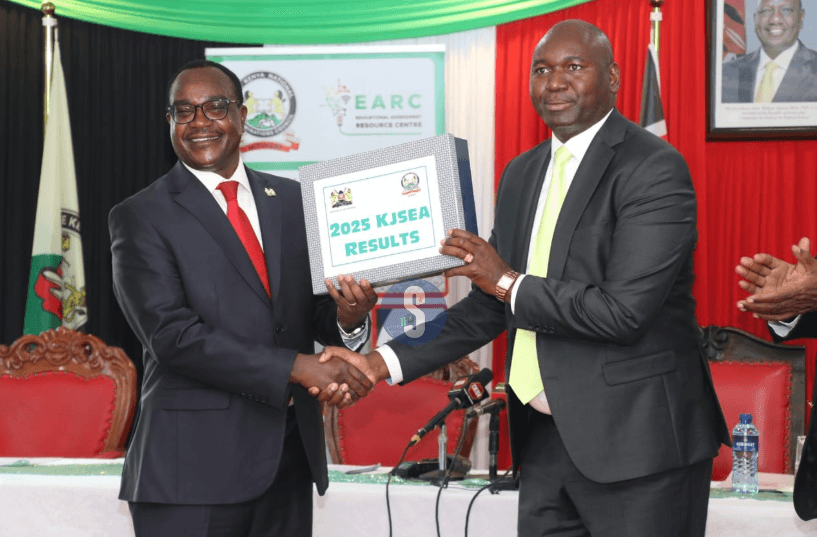The task force on police reforms wants the members of the National Police Service Commission to leave office.
The team said the NPSC leadership has acquiesced to the continued usurpation of its functions by the National Police Service leadership, thereby exacerbating the vices that it was established to redress.
“It has also generally been unable to develop policies and institute measures that would enable it to perform its constitutional and statutory obligations.”
“In the circumstances, the Taskforce has been left with no option but to recommend that Government considers initiating a negotiated exit, or any other legally recognised modality, for the current Commissioners of NPSC,” said part of the report presented by retired chief justice David Maraga.
It also recommended that the Police Airwing be restored to the exclusive control of NPS forthwith.
However, the restored Airwing should be operated in strict adherence to Kenya Civil Aviation Authority (KCAA) standards on maintenance and airworthiness, including qualifications, training, and relevant accreditation of professionals working in NPSAW.
The task force urged Parliament to provide adequate resources and budgetary support for the effective and optimal operation of NPSAW.
On its part, NPSC should provide competitive terms of remuneration for professionals involved in the running and maintenance of police aircraft to ensure their retention in NPSAW.
Alternatively, the Taskforce recommends the Lease Hire of Police aircraft as is the case with Police motor road transport.
The task force urged the Government to adequately fund the NPS to modernize its facilities, equipment, and gear, enhance its logistical and technological capabilities as well and provide decent housing for NPS officers to enable the Service to discharge its mandate efficiently and effectively.
The team recommended the restructuring of the current Traffic Police Unit into a new Traffic Management Unit that is well-trained, leaner in numbers, and mainly reliant on technology to control and manage traffic flow in the country.
“The taskforce envisages the use of technology in the detection of traffic infractions, and the attendant fines becoming cashless by use of technology.”
“While that is being done, the task force recommends appropriate amendment of Section 65 of the NPS Act within six months and the abolition of police roadblocks and their replacement with mobile patrol units,” the team says.
Fresh police vetting
The Maraga team said the circumstances, and to ascertain whether the current top leadership of the NPS has the competence, integrity, and experience required to drive the requisite reforms and achieve the vision of the Service, the team recommended a fresh vetting by an independent panel to be appointed by the President for all officers of the rank of Senior Superintendent of Police (SSP) and above.
It urged the Cabinet Secretary for Interior and National Administration to immediately develop a bill and request Parliament to enact legislation to reinstate the constitutional requirement for the open, transparent and competitive recruitment of the Inspector-General, the Deputy-Inspectors General, and the Director of Criminal Investigations as was provided for under Sections 12, 13 and 30 of the NPS Act before the 2014 amendment.
To enhance professionalism in NPS, the task force recommended that the minimum qualifications for recruitment into the Service should be raised to grade C minus (C-) in KCSE.
However, for the marginalized areas, the task force recommends the retention of Grade D+ when there are no applicants with grade C- in KCSE.
After recruitment, the initial training should be extended from nine months to 12, with emphasis placed on competency-based training in line with international policing standards and the introduction of a practical attachment component to the training of NPS officers.
To address junior officers’ complaints on transfers and deployments, the task force recommends the amendment of Regulation 9 (1) of the NPSC (Transfer and Deployment) Regulations to limit operational deployments to a period not exceeding six months.
In all other deployments, the Taskforce recommended that no person should serve in one county for more than three (3) years, save for those deployed to the specialised units.
Regarding promotions, it is the view of the task force that a professional and motivated NPS should be based on a clear career progression and advancement path that takes into consideration factors such as competence, integrity, training relevant qualifications, skills and experience.
The team established that the stagnation of junior officers in one rank, in many cases until retirement, is the source of widespread discontent and low morale in the Service.
It recommended the establishment of grades of Inspector II and I and the introduction of Constable III, II, and I, and Corporal III, II, and I within the same ranks, all of which must be filled through open and competitive promotions based on merit.
The team said it had established from recent history that rather than restrict themselves to the development of policies, there has been systemic micro-management of the Service by previous Cabinet Secretaries that has significantly eroded the operational independence of the Service.
To remedy this situation, the team recommended that the Cabinet Secretary should develop a Sessional Paper on policing and reforms to guide the long-term transformation of NPS and thereby take immediate and urgent steps to address the current policy and oversight gaps in the Services, such as the operationalisation of the Police Reform Unit envisaged under Section 126 (2) (b) of the NPS Act.
The team recommended the restructuring of the command and staffing in the NPS by maintaining the distinction between the three Services only up to the NPS inspectorate level, the designation of NPS Gazetted Officers as NPS officers without affiliation to any particular Service and subjecting all Gazetted Officers to the same training and promotional standards and thereafter deploying them for duty in any of the three Services.
Further, the team recommend beefing up the Administration Police Service's strength, and that the Inspector-General, in consultation with the Joint Service Board, should establish formations in the Administration Police Service to enable the Service to effectively perform its functions as required by Sections 10 and 27 of the NPS Act.
The Maraga team recommended that the IG and the Director-General, of Kenya Coast Guard Service (KCGS), develop structures and procedures for engagement between KCGS and the Border and Sea Operations Team (BORSOBTS) to guide multi-agency approach in the policing of Kenya’s territorial waters under the KCGS.
It recommended that Parliament should amend Section 87 of the NPS Act to provide for competitive recruitment of the Internal Affairs Unit (IAU) Director, secure the tenure of the Director and clearly state the Director’s mandate, decentralisation of the Unit’s functions and expressly authorise the IAU to enforce discipline and professional standards within the NPS.
“The NPS Act should be further amended to focus the functions of IAU on strictly disciplinary offences and not criminal matters that fall within the purview of DCI and the Independent Policing Oversight Authority.”













